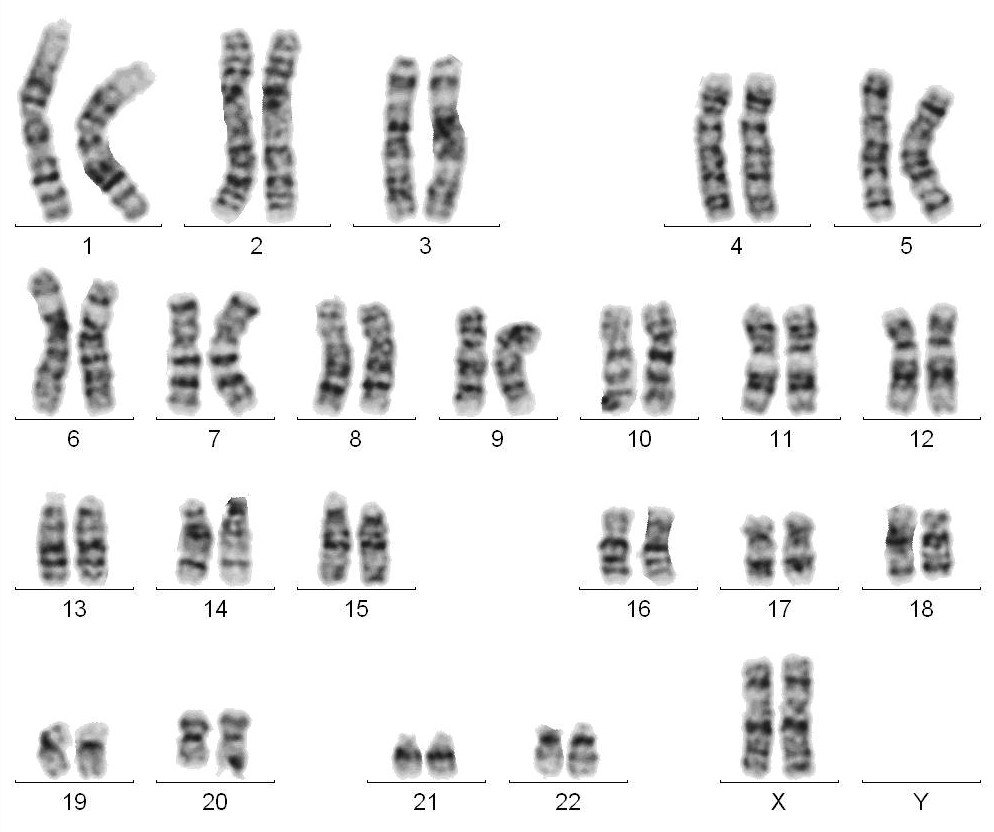What is amniocentesis?
Amniocentesis is performed between 16 and 20 weeks of pregnancy using a sonography-guided needle that penetrates the belly and enters the amniotic cavity to extract amniotic fluid. Containing fetal cells, the amniotic fluid of 20-30 C.C. is extracted. After culturing the cells for 2-3 weeks, the fetal chromosomes are examined to find out whether the fetus has chromosomal abnormalities. The accuracy rate of the examination is higher than 99%.
The most common fetal chromosomal disorder is Down's syndrome. Down syndrome occurs when a baby is born with an extra chromosome 21, leading to intellectual disability and congenital heart disease. The older the woman, the more likely she is to have a Down's baby. For this reason, the current policy of department of health recommends amniocentesis in pregnant women over 34 years of age.
- A karyotype of a normal female

Is amniocentesis dangerous?
Amniocentesis is a relatively safe procedure with minimal risk to the patient and fetus. In few cases, abdominal discomfort and vaginal bleeding may occur, while premature rupture of membranes, chorioamnionitis in severe cases, resulting in miscarriage and stillbirth. According to statistics, the incidence of miscarriage caused by amniocentesis is about 1 in 1000 to 3 in 1000.
Who needs an amniocentesis?
- Pregnant women over 34 years old.
- Pregnant women at high risk identified by the Down's syndrome test (with a risk value greater than 1/270).
- Women who have been pregnant with or given birth to fetuses with chromosomal or congenital abnormalities.
- You or your spouse has chromosome abnormalities or either of you is a carrier of a genetic disease.
- Those whose family members have Down syndrome or chromosomal abnormalities.
- Pregnant women suspected of fetal abnormalities by ultrasonography
At present, the National Health Insurance program has not covered amniocentesis, and the self-paid fee for amniocentesis in the hospital is about NT$10,000. Those who meet the above conditions can apply for a subsidy of NT$5,000 from the Ministry of Health and Welfare. We will ask you to fill in a subsidy form and deduct the cost directly at the cashier counter.
Notes after amniocentesis
- After amniotic fluid is drawn, slight stabbing pain at the abdominal pinhole is normal. There may also be brief periods of abdominal tightening, hardening and uterine contractions, and if contractions are not very frequent (more than 4 contractions per hour), just taking more rest would be fine.
- Please take more rest after having amniotic fluid drawn. Don’t work too hard, spend a lot of time standing or walking, lift heavy stuff (more than 5kg) and hold children. Avoid sexual intercourse, travel and strenuous exercise for a week.
- The adhesive bandage on the abdomen can be removed before bathing/showering without putting it on again. Patients can eat normally. If prescribed, please take medicine regularly as directed by medical staff.
- In case of regular abdominal tightness and pain, vaginal bleeding or watery fluid exudation, severe abdominal pain or fever, please immediately go to the delivery room on the 7th floor of Lifu Medical Building for examination (no registration required). 24-hour special line for the delivery room: (04) 22026083.
Results of amniocentesis
- The amniocentesis report will come out in about 2-3 weeks. You can check the report at the next consultation or call the doctor to inquire about the report at the time arranged by the doctor.
- There are tens of thousands of genes on 23 pairs of chromosomes in the human body. Traditional amniocentesis can detect an abnormal chromosome number, chromosome translocation or deletion or increase of large chromosome fragments (>5Mb). However, for the abnormality of deletion or increase of chromosome micro-fragments (<5Mb), or the problem of gene defects, array CGH (at the patient’s expense of NT$18,000) or gene testing must be added to detect it.
- Chromosomal examination cannot reveal structural abnormalities, such as cleft lip, cleft palate and congenital heart disease. Therefore, normal results of amniocentesis cannot rule out genetic defects or structural abnormalities in the fetus.

